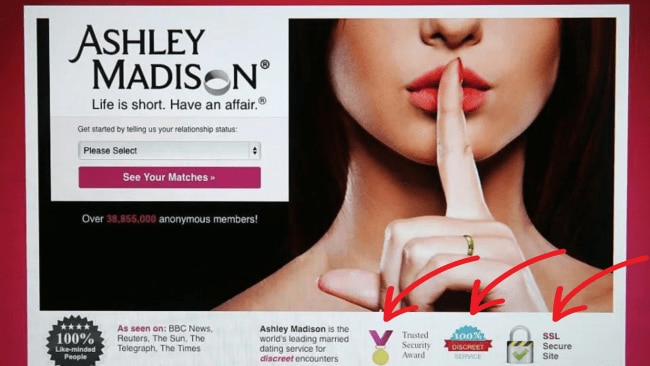Exactly how Ashley Madison convinced 37 million people to have an affair
The Netflix doco dives deeper than its salacious premise. So, is there any truth behind their controversial claims?

Lifestyle
Don't miss out on the headlines from Lifestyle. Followed categories will be added to My News.
When I sat down to watch Netflix’s new documentary series, Ashley Madison: Sex, Lies & Scandal, I expected nothing more than a sleazy exposé.
After all, ashleymadison.com (which yes, is still active and going strong) is infamous for being the website where married people go to find other married people to cheat with.
But the documentary dives deeper than its salacious premise.
It recounts the events of 2015 when hackers leaked the identities of the site's 37 million members, from their names, home and work addresses, phone numbers, birthdays, and even credit card transactions.
The fallout was immense, impacting many lives in unforeseen and, as we find out, tragic ways.
From the picture-perfect Texas Christian vlogging couple Nia and Sam Rader, to Christi Gibson, who lost her minister husband to suicide days after he was exposed and subsequently lost his job, the documentary offered a raw, heartbreaking glimpse into the repercussions of the hack.
These stories, told through interviews with the couples and people affected, stayed with me for days afterwards.
Want to join the family? Sign up to our Kidspot newsletter for more stories like this.

RELATED:‘Oops!’ Paris Hilton responds to parenting critics on TikTok
How did they do it?
It really got me thinking... 37 million people? That’s more than the entire population of Australia!
By a lot!
And in a country as religious as the US, how on earth did Ashley Madison manage to convince so many people to cheat?
Well, as the series shows us, the answer lies in their bold marketing strategy.
They didn't just target people already inclined to cheat, they actively marketed infidelity to everyone as a solution to saving their marriages.
Cheating was, essentially, the product, and they were simply facilitating it.
1) Reframing the narrative of a happy marriage
The first step was reframing the narrative: cheating wasn’t the end of a marriage - it was a solution for those stuck in the mundane routine of married life.
The site promised excitement and escape from the daily grind and responsibilities - which perfectly targeted parents, like vlogger Sam Rader, exactly when they were feeling vulnerable and worn down.
Noel Biderman, the CEO and self-proclaimed ‘King of Infidelity,’ despite his own monogamous marriage, was behind this message.
He went on every daytime TV show and radio station and shamelessly championed the idea that an affair could save your marriage.
Ironically, but perhaps unsurprisingly, he, too, was exposed in the leak.
Introducing our new podcast: Mum Club! Listen and subscribe wherever you get your podcasts so you never miss an episode.
RELATED: Sam Armytage FWAW contract exposes Natalie’s fate as host
2) Their controversial marketing
Ashley Madison's advertising campaigns echoed Biderman's message, although they were designed to be even more provocative.
Unfortunately, that cursed jingle is still in my head after watching the documentary!
"I'm looking for someone other than my wife,
Other than my wife. Other than my wife."
My partner (male) is very confused as I potter around the house singing this.
They also used taglines like “Life is short. Have an affair” and “Your wife is hot, but so are ours” which were plastered on billboards across the country.

3) The promise of secrecy
Lastly, Ashley Madison convinced people to sign up for their site by assuring complete discretion.
However, the hackers dramatically debunked this claim and showed that the company had made completely fake promises of cybersecurity.
An ex-employee even went on the record to say that they had designed fake logos and certificates that sat on their homepage.
You also have to remember that this was the 2000s, so people were far less savvy about internet security and sharing their data.
So, is there any truth to their claims of infidelity helping marriages?
Psychology Todaysheds light on this question by sharing the findings of Sociologist Alicia M. Walker’s research.
In her paper, “Having Your Cake and Eating It, Too: Factors Impacting Perception of Life Satisfaction During Outside Partnerships,” she conducted an anonymous survey of 1,270 Ashley Madison users, aiming to understand why some people choose infidelity as a means to maintain their marriages.
Here are the main findings:
- Higher life satisfaction during affairs: Participants reported higher life satisfaction during their extramarital relationships (7.68 out of 10) compared to before (5.47). While the satisfaction score dropped post-affair, it remained higher than pre-affair levels, indicating a lasting positive effect.
- Reasons for cheating: Emotional reasons for infidelity included unmet intimacy needs and the desire for emotional support. Sexual dissatisfaction also played a significant role, with reasons ranging from lack of variety to long-distance challenges.
- Gender: Women, in particular, reported higher life satisfaction during and after affairs, possibly due to increased emotional connection over time.
- Risks: There are many risks associated with extramarital affairs, such as sexually transmitted infections and developing sexual compulsions, which may impact people's life satisfaction post-affair.
The study concludes that while cheating can boost life satisfaction temporarily, the long-term sustainability and ethical implications are complex.
In saying that, she concludes that infidelity can serve as a successful, albeit controversial, strategy for people to maintain marital stability and personal satisfaction.
So, it seems there's no right or wrong answer, which begs the question - is Ashley Madison as evil as they've been painted to be...?
More Coverage
Originally published as Exactly how Ashley Madison convinced 37 million people to have an affair





